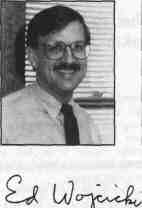 |
Home | Search | Browse | About IPO | Staff | Links |
 |
Home | Search | Browse | About IPO | Staff | Links |
A Conversation with Our Readers
The vision that guides this magazine Readers: In recent weeks I've been reading a 22-year-old document, the original proposal for the creation of Illinois Issues. The vision was clear: Illinois needed a magazine with a passion for state government, and Sangamon State University could provide the perfect launching site with its access to state government officials, Statehouse journalists and scholars. But magazines are expensive propositions. So in 1973 three people — Sam Gove, Sam Witwer and Paul Simon, with advice and assistance from others — drafted a grant proposal asking the Ford Foundation for the money to get Illinois Issues off the ground. From the beginning they envisioned a publication with provocative articles not likely to be found in the daily press and a product guided by a diverse advisory board well- seasoned in Illinois public affairs. Well, the Ford Foundation approved a grant, and Illinois Issues published its first issue in January 1975. Bill Day, the first publisher, and Mike Lennon describe in the pullout section in the middle of this magazine more details about Illinois Issues' early days. We also reveal in this section the 10 winners of the 1995 Award for Extraordinary Public Service, and on the tearout card, we invite your reactions to this list. A special word of thanks to you, our readers, for your encouragement, support and interest in the past two decades. Your expressions of dependence on our product make us continually aware of our responsibility to analyze Illinois government reliably and fairly, but in the end, we know we have an interdependent relationship with you. We know we have to satisfy you. We also know that providing a balanced perspective is the only way to go because our readers, like our board, are a well-educated group of Republicans and Democrats, social activists and corporate executives, as well as academics and career public officials. And there are others, too — many people who seek a better handle on what Illinois government is doing. I hope you enjoy the special pullout section that helps you review the past 20 years. Our commitment to you in the future is to live up to our reputation as the state's best public affairs magazine by defying conventional wisdom, getting beyond the spin and keeping you abreast of what's really happening. Elsewhere in this issue, you'll find our features on affirmative action timely. Michael Hawthorne examines the political and social currents that underlie the current debate (see page 10), and Mary A. Mitchell, in a first-person essay, details the positive effects of affirmative action in her life (see page 15). In response to your requests for more personality profiles, this issue also features the career of Terry Gainer, the director of the Illinois State Police. But it's no ordinary profile. It's the story of a leader whose troops don't like everything he's doing (see page 18). Finally, Jennifer Halperin, our Statehouse bureau chief, has an interesting piece about the growing Orthodox Jewish community in Chicago's West Rogers Park. Many younger people are attracted to the strong family sense in the neighborhood (see page 26). Many readers say no to taxes for college sports
Nearly three-fourths of the respondents said no.
The typical reason given was that
the money would be better spent on
other educational programs. Several
readers said that tax revenue should be
spent on "education," and intercollegiate sports is considered by some to
be entertainment, not education.
"Alumni foundations should fund
athletic programs," a Springfield reader wrote. "In today's world of rising
taxes, the revenues generated should
go to educate, not entertain."
A suburban reader, echoing the
thoughts of several others, said,
"There is too much emphasis on sports
today. Sports are important and entertaining, but not necessary when using
state tax dollars."
Several readers said intercollegiate
sports don't assist enough students,
and more funding should be allocated to intramural sports that attract participation from more students. And a few
readers called college sports training
camps for the National Football
League and National Basketball
Association, and said these pro sports
leagues should help fund the college
programs.
On the other hand, a number of
readers expressed great support for
tax-supported college athletic programs. A Carol Stream reader
explained that sports can be educational: "I believe [that sports] is part of the
overall upbringing and education of a
person. This is something everyone
can participate in if they wish, either
as a participant or as an observer and
fan. It teaches teamwork and supporting something with other people."
Several readers consider sports a
legitimate extracurricular activity. A
Wheaton reader said sports are "just
like participating in the band, theater
department, student governance, etc.
Each of these is supported in part by
taxes."
Ed Wojcicki November 1995/Illinois Issues/3
|